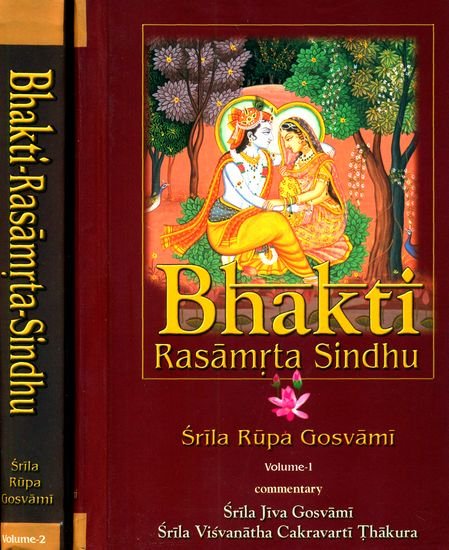Bhakti-rasamrta-sindhu
by Śrīla Rūpa Gosvāmī | 180,912 words
The English translation of the Sri Bhakti-rasamrta-sindhu verse 2.1.213; a medieval era Sanskrit book, written by Rupa Goswami (fl. 15th century) which represents a devotional (bhakti) masterpiece. In this work Goswami describes the nature and different forms of pure love (rasa) as well as various other topics on Vaishnavism and devotion.
Verse 2.1.213
Sanskrit text, Unicode transliteration and English translation:
यथा वा —
ब्रह्म-रात्रि-ततिर् अप्य् अघ-शत्रो
सा क्षणार्धवद् अगात् तव सङ्गे ।
हा क्षणार्धम् अपि वल्लविकानां
ब्रह्म-रात्रि-ततिवद् विरहे’भूत् ॥२.१.२१२॥yathā vā —
brahma-rātri-tatir apy agha-śatro
sā kṣaṇārdhavad agāt tava saṅge |
hā kṣaṇārdham api vallavikānāṃ
brahma-rātri-tativad virahe’bhūt ||2.1.212||
English translation
Sanskrit text, Unicode transliteration and English translation:
अनोथेर् एxअम्प्ले:
“किल्लेर् ओf अघ! इन् योउर् अस्सोचिअतिओन्, थे निघ्त् ओf ब्रह्मा हस् पस्सेद् लिके हल्f अ मोमेन्त् fओर् थे चोwहेर्द् wओमेन्. नोw, इन् सेपरतिओन् fरोम् योउ, हल्f अ मोमेन्त् हस् बेचोमे अस् लोन्ग् अस् ब्रह्मा’स् निघ्त् fओर् थेम्.”
(६३) वेणु-माधुर्यम्, यथा तत्रैव (१०.३३.१५) —
सवनशस् तद्-उपधार्य सुरेशाः
शक्र-शर्व-परमेष्ठि-पुरोगाः ।
कवय आनत-कन्धर-चित्ताः
कश्मलं ययुर् अनिश्चित-तत्त्वाः ॥२.१.२१३॥Another example:
“Killer of Agha! In Your association, the night of Brahmā has passed like half a moment for the cowherd women. Now, in separation from You, half a moment has become as long as Brahmā’s night for them.”(63) veṇu-mādhuryam, yathā tatraiva (10.33.15) —
savanaśas tad-upadhārya sureśāḥ
śakra-śarva-parameṣṭhi-purogāḥ |
kavaya ānata-kandhara-cittāḥ
kaśmalaṃ yayur aniścita-tattvāḥ ||2.1.213||
English translation
(63) veṇu-mādhuryam: the sweetness of Kṛṣṇa’s flute. An example from the Śrīmad-Bhāgavatam [10.35.14-15]:
“O pious mother Yaśodā, your son, who is expert in all the arts of herding cows, has invented many new styles of flute-playing. When He takes His flute
to His bimba-red lips and sends forth the tones of the harmonic scale in variegated melodies, Brahmā, Śiva, Indra and other chief demigods become confused upon hearing the sound. Although they are the most learned authorities, they cannot ascertain the essence of that music, and thus they bow down their heads and hearts.”
